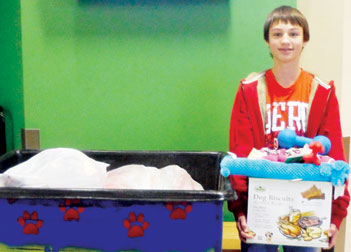In spite of uncertainty, Israel continues to thrive
 There is nothing more certain in Israel than uncertainty.
There is nothing more certain in Israel than uncertainty.
While things in the Jewish state may be more uncertain than ever before, its American-born ambassador assured the audience more than once during his presentation Monday night that Israel will survive and is not alone because of its friendship with the United States, Israel’s best and strongest ally.
The Ambassador of Israel to the United States Michael Oren was in Overland Park to speak at an event sponsored by the Jewish Community Relations Bureau|American Jewish Committee. Battling a virus, he was traveling in the Midwest to serve as the featured speaker at Kansas State University’s Landon Lecture Series on Jan. 29, where he was expected to discuss “Israel, The Ultimate Ally.” He was traveling throughout the Sunflower State with Roey Gilad, the consul general to the Midwest based in Chicago, and was also expected to visit Fort Leavenworth in Leavenworth, Kan., before returning to Washington, D.C.
The 20-minute speech by one of Israel’s most well-known dignitaries was often a pep talk. Preaching to a mostly Jewish audience, he called attention to the fact that no matter what challenges occurred during Israel’s 64-and-a-half years, its people have continued to survive and thrive.
He emphasized that Israel is still strong, “despite facing challenges as daunting as ever” brought by people who want nothing better “than to see us wiped off the map.”
Oren has served as Israel’s ambassador to the United States since June 2009 and last visited the metro area five years ago. Speaking to an overflow crowd estimated at more than 550 that spilled into the Campus’ dining hall area, he gave dozens of examples about the strength and resiliency of the Israeli people, who now number close to 8 million people. For instance, there are now more people who speak Hebrew than Finnish and Danish, and Hebrew speakers will soon outnumber those who speak Swedish.
He believes Israelis can be most proud of the fact that from its creation it has been a sovereign and democratic state.
“Seconds after we declared our independence in 1948, we were attacked by six Arab armies that wanted to knock us back into the sea,” he said. “We had 600,000 people armed with handguns and we won.”
Oren proudly pointed out that Israelis are highly educated, rated second in the world in per capita education.
“After Canada, we are the most highly educated country in the world,” he said.
“Israel is the only country with more Nobel prizes per capita than Olympic medals,” he added.
The Jewish state, according to Oren, is now a “techno powerhouse.” He said every major American technical company has two research and development centers in Israel.
“All of your computers, all of your cell phones are working with components and parts and concepts developed in the State of Israel,” he said.
 Oren has been called one of the five most influential Jewish leaders in America and one of the 10 most influential Jewish leaders worldwide. He has been instrumental in securing U.S. support for Israel’s defense and upholding Israel’s right to security and peace. He briefs Israeli Prime Minister Benjamin Netanyahu and other Israeli leaders on issues vital to the U.S.-Israel alliance.
Oren has been called one of the five most influential Jewish leaders in America and one of the 10 most influential Jewish leaders worldwide. He has been instrumental in securing U.S. support for Israel’s defense and upholding Israel’s right to security and peace. He briefs Israeli Prime Minister Benjamin Netanyahu and other Israeli leaders on issues vital to the U.S.-Israel alliance.
He touched on the unrest in the entire Middle East, the challenges of chemical weapons in the hands of the Syrian army as well as the serious issues the Iranian nuclear program poses for Israel’s security. Oren also mentioned the problems Hezbollah continues to cause.
“Rarely in Israel’s history have we faced so many insurmountable dangers at the same time,” he said.
He noted the negotiations with the Palestinians are yet another challenge the Jewish state faces, as Israel has tried for four years to get the Palestinians to sit down and talk.
“The government of Prime Minister Netanyahu is committed to achieving a comprehensive peace with the Palestinians … but we have to succeed in getting the Palestinians to negotiate with us.”
Oren said the Palestinians want to get the territory without getting the peace.
“They are having reconciliation talks with Hamas in Gaza. If you look at the Hamas covenant, it’s dedicated not only to destroying the State of Israel, it’s dedicated to destroying the Jewish people worldwide. It’s a genocidal organization,” Oren said.
Oren pointed out Israel is committed to negotiating directly with the Palestinians leading to a two-state solution, “living side-by-side with a Jewish state and a Palestinian state.”
“We are willing to start negotiations today in Jerusalem, in Ramallah, in Kansas, we don’t care as long as the Palestinians negotiate with us.”
During the question-and-answer period he reiterated that Israel doesn’t have pre-conditions for negotiations, but has positions it will not back down from. One such condition is the recognition of the Jewish people.
“We recognize the Palestinian people and we need them to recognize Jewish people with the right of self-determination,” he said.
It was the last question of the night that sparked the most emotion. Jan Present first announced that she didn’t trust the current U.S. administration’s support of Israel and then asked Oren what the United States could and should do to support Israel.
Some in the audience booed her question. The ambassador did not waiver as he reminded the crowd — something he had already pointed out in his prepared remarks — that the United States is indeed Israel’s biggest ally.
“We’ve never been entirely alone. Today we have the United States of America, the most multi-faceted, deepest alliance that this country has had with any country in the post World War II period. It’s an alliance based on common faith, based on deep spiritual ties, common democratic values and a very expensive strategic alliance,” he said earlier in the evening.
To answer the question, he simply said, “The United States does so much for Israel.
“It’s beyond the military aid, which is about $3 billion a year. That aid enables us to meet some of our challenges,” he said.
He noted that the United States was also one of the few countries to stand with Israel against the Iranian nuclear challenge.
“Do we have disagreements? Yes we have disagreements. There are no two allies in history who have not had disagreements. These did not begin with this administration.
“The true litmus of any alliance is not whether you agree all the time … it’s how you discuss your disagreements, how you get by them and how you continue to cooperate in meeting the challenges which confront both the United States and Israel.
“And on that score, I am completely confident that the United States is doing an outstanding job,” the American-born ambassador concluded, while the audience rewarded him with a round of applause.
The evening wasn’t strictly a rah-rah session for Israel. During the Q&A, Sam Devinki asked why Israel allows people to build housing in controversial areas. Oren then discussed the settlements, saying that if controversy would deter “us, I don’t think we’d have the State of Israel today.”
“Settlements are not the source of controversy. There was controversy 50 years before the first settlement was ever built,” he said.
He continued, “In 2005 we ripped out 21 settlements out of the Gaza strip to try to advance the peace process and it didn’t bring us peace. It brought us about 9,000 rockets.”
Another question was posed by Ellen Portnoy, whose daughter Lara Portnoy made aliyah last week. She asked what the government was doing about the problems young people are currently facing in Israel, specifically finding jobs and affordable housing. Oren didn’t really answer that question directly. Instead, he took the opportunity to discuss the role young Israelis had in last week’s election, in which almost 70 percent of Israelis voted and showed their support for Prime Minister Netanyahu.
An 11-year-old boy (Jake) who asked the ambassador, “What can Jewish children do to support peace?” was met with a warm response from the friendly audience. His question went along well with BIAV’s Rabbi Daniel Rockoff’s opening prayer of the evening.
“May the relationship between the (United States and Israel) continue to be one of mutual respect and shared value in the spirit of Moshe and Yitro. Bless and protect the people of Israel … and bless and protect the United States of America. Amen.”



 Earlier this month the Vaad KaKashruth of Kansas City announced that Boulevard Brewing Company is now under its kosher supervision.
Earlier this month the Vaad KaKashruth of Kansas City announced that Boulevard Brewing Company is now under its kosher supervision. Classical music lovers will be in for a treat on Sunday, Feb. 10, when Israeli musicians Ilan Schul and Mula Sajevitch present classical and Klezmer music at Park University. The concert will be held at 3 p.m. at Graham Tyler Memorial Chapel, 8700 N.W. River Park in Parkville, Mo. Faculty and students from Park University’s International Center for Music will perform as well. Tickets are $15 per person, $10 for seniors, and are available at the door.
Classical music lovers will be in for a treat on Sunday, Feb. 10, when Israeli musicians Ilan Schul and Mula Sajevitch present classical and Klezmer music at Park University. The concert will be held at 3 p.m. at Graham Tyler Memorial Chapel, 8700 N.W. River Park in Parkville, Mo. Faculty and students from Park University’s International Center for Music will perform as well. Tickets are $15 per person, $10 for seniors, and are available at the door. The first half of the concert will consist of the Brahms Clarinet Quintet, which Schul explained is “one of the most monumental chamber music works of the 19th century.” He said it was written for a gypsy clarinetist, and illuminates musical elements of the gypsy flavor. In addition to Schul and the brothers, the performers will include David Radzynski on violin, Peter Chun on viola and Daniel Veis playing the cello.
The first half of the concert will consist of the Brahms Clarinet Quintet, which Schul explained is “one of the most monumental chamber music works of the 19th century.” He said it was written for a gypsy clarinetist, and illuminates musical elements of the gypsy flavor. In addition to Schul and the brothers, the performers will include David Radzynski on violin, Peter Chun on viola and Daniel Veis playing the cello.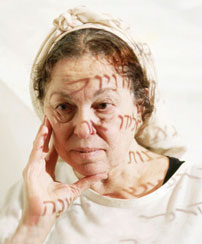 Although an Orthodox neighborhood in Brooklyn is only a short subway ride from the artsy enclaves of the West Village in Manhattan, the space between is immense, according to artist Helene Aylon.
Although an Orthodox neighborhood in Brooklyn is only a short subway ride from the artsy enclaves of the West Village in Manhattan, the space between is immense, according to artist Helene Aylon.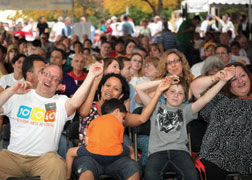
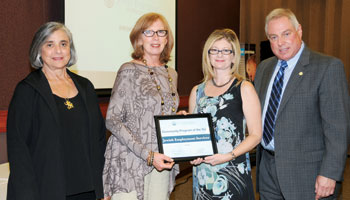 Bryan Schmutz is really busy these days as part of the marketing team at the Jewish Community Center. He’s happy in his position of marketing coordinator/webmaster — one that Jewish Employment Services helped him to land. Schmutz gives much credit to JES helping him land the JCC job.
Bryan Schmutz is really busy these days as part of the marketing team at the Jewish Community Center. He’s happy in his position of marketing coordinator/webmaster — one that Jewish Employment Services helped him to land. Schmutz gives much credit to JES helping him land the JCC job. The topic of mental illness is one that touches many lives — one in four Americans struggle with mental illness in any given year.
The topic of mental illness is one that touches many lives — one in four Americans struggle with mental illness in any given year. Kansas Poet Laureate Caryn Mirriam-Goldberg has crafted a beautiful, moving story about the lives of two survivors of World War II, both of whom ended up at the University of Kansas where they became close friends. She interviewed both men over the course of several years. Now in “Needle in the Bone,” she exquisitely combines their World War experiences into a narrative that informs readers and at times brings them to tears. She also demonstrates the power of friendship and a belief in the essential goodness of people which can overcome prejudice, misconceptions and the devastation of history.
Kansas Poet Laureate Caryn Mirriam-Goldberg has crafted a beautiful, moving story about the lives of two survivors of World War II, both of whom ended up at the University of Kansas where they became close friends. She interviewed both men over the course of several years. Now in “Needle in the Bone,” she exquisitely combines their World War experiences into a narrative that informs readers and at times brings them to tears. She also demonstrates the power of friendship and a belief in the essential goodness of people which can overcome prejudice, misconceptions and the devastation of history.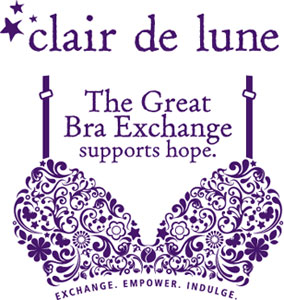 Although Kansas City’s Hope House and Overland Park’s clair de lune lingerie boutique each focus on increasing a woman’s self esteem, the reasons women seek them out couldn’t be more different. Last year Hope House served 10,000 victims of domestic violence in its two Kansas City-area shelters and Comprehensive Outreach Programming and clair de lune sold high-quality bras and lingerie to hundreds of women throughout the region.
Although Kansas City’s Hope House and Overland Park’s clair de lune lingerie boutique each focus on increasing a woman’s self esteem, the reasons women seek them out couldn’t be more different. Last year Hope House served 10,000 victims of domestic violence in its two Kansas City-area shelters and Comprehensive Outreach Programming and clair de lune sold high-quality bras and lingerie to hundreds of women throughout the region.